Land Rover Discovery Sport: prototype ride review
We take a passenger ride in a new Land Rover Discovery Sport hot off the production line at Hailwood
Jaguar Land Rover’s Halewood plant is a remarkable British success story. In the past four years the workforce has trebled and production quadrupled, thanks to the storming success of the Freelander 2 and Range Rover Evoque, with a new car rolling off the line every 80 seconds. Now the Land Rover Discovery Sport is looking to continue the Merseyside factory’s run of form.
Up to the end of 2013, Freelander 2 sales totalled more than 920,000, while 200,000 Evoques were built in its first two years on sale – a new record for JLR.
In preparation for the arrival of the Discovery Sport, the company has invested £200m in Halewood and hired another 250 staff to cope with running the plant at full capacity on a three-shift, 24-hour pattern. We travelled to Merseyside to see how Halewood is integrating an all-new model and to take a passenger ride in an early pre-production car, straight off the line.
While Jaguar has built an all-new facility in Solihull, W Mids, to manufacture its forthcoming XE saloon and crossover, Land Rover has gone through a relatively painless process in adapting the line at Halewood to accommodate the Discovery Sport.
As the new car shares largely the same underpinnings as the Evoque and Freelander, all three can happily be built cheek-by-jowl at the same factory.
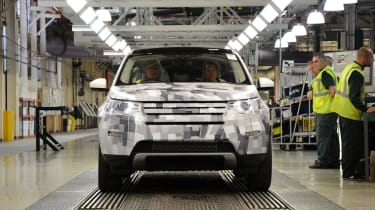
We caught up with the Discovery Sport on the Customer Acceptance Line (CAL) – the final chance for quality checks to be carried out before models are shipped out to distributors. The car we rode in was wearing camouflage on the outside – although the interior was fully exposed – as the car was yet to be publicly revealed on the day we visited.
Even so, seeing it behind a Freelander on the line highlighted why Land Rover chose a fresh name. Longer and more rounded than the boxy Freelander it’ll replace, the Discovery Sport’s design is more stylish than utilitarian, although the 5+2 seating layout makes it far more practical than the 5-seat Freelander.
Once our car got the thumbs-up, we jumped in the passenger seat for a ride around the ‘squeak and rattle circuit’ – a short track that includes severe cambers, bumps and ruts, just to check the cars are perfectly put together before they’re sent off to customers.
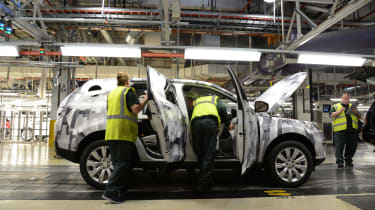
As ‘job one’ (the first full production vehicle) isn’t due until 13 October, you’d forgive this prototype the odd rattle, but it felt rock-solid, and besides the odd untextured pre-production piece of plastic trim, looked good to go.
We won’t attempt to deliver any meaningful impressions from such a short passenger ride, but the familiar 2.2-litre diesel engine and nine-speed automatic box werehushed and smooth, and we could hear the bumps more than we could feel them, which bodes well for the ride.
The interior itself is a feast of intelligent touches. You sit high with a fantastic view out the front, while the layout of the dash is simple but well executed with expensive-feeling switchgear borrowed from the F-Type and a colourful new interface for the infotainment system.
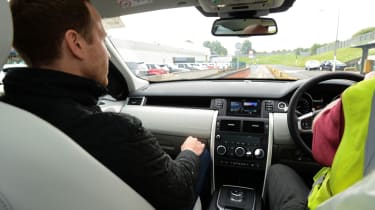
The second-row seats – which split 60:40 – are raised up slightly and can slide back and forth, so you can sacrifice some legroom in the second row to make more space for third-row passengers.
The third-row seats can be pulled out of the boot floor with one hand, and we can confirm that they are just big enough for adults, although only for short trips. Up to six USB charging points, individual air-con controls, deep storage bins and cup-holders galore mean the interior is cleverly tailored for the modern family, too.
Although Land Rover is being coy about projected sales figures for the Discovery Sport at this stage, we’d be amazed if it doesn’t result in a hat-trick of sales smash hits for Halewood.
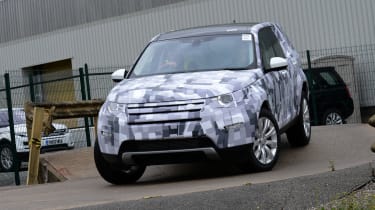
Jaguar Land Rover Hailwood plant: five facts
• The Merseyside plant was opened by Ford, with an Anglia the first car to roll off the line in March 1963.
• In the eighties, Halewood was the centre of European Escort production. But in 1997, Ford said its replacement, the Focus, would be made in Europe.
• Ford-owned Jaguar stepped into the breach with its X-Type. Joining it at Halewood have been the Land Rover Freelander and Range Rover Evoque.
• In March 2014, JLR geared up to build the Discovery Sport by installing a £45m state-of-the-art Aido servo press at the site. This is capable of shaping up to 700 panels an hour.
• Also, the company now has 4,750 workers at Halewood – three times as many as in 2010. They’re working 24 hours a day to a three-shift pattern.
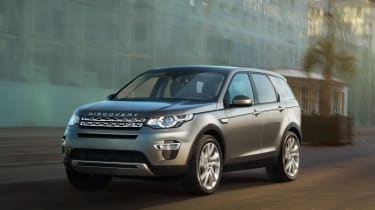
Get full official deatils and more pics of the new Land Rover Discovery Sport here
Find a car with the experts




